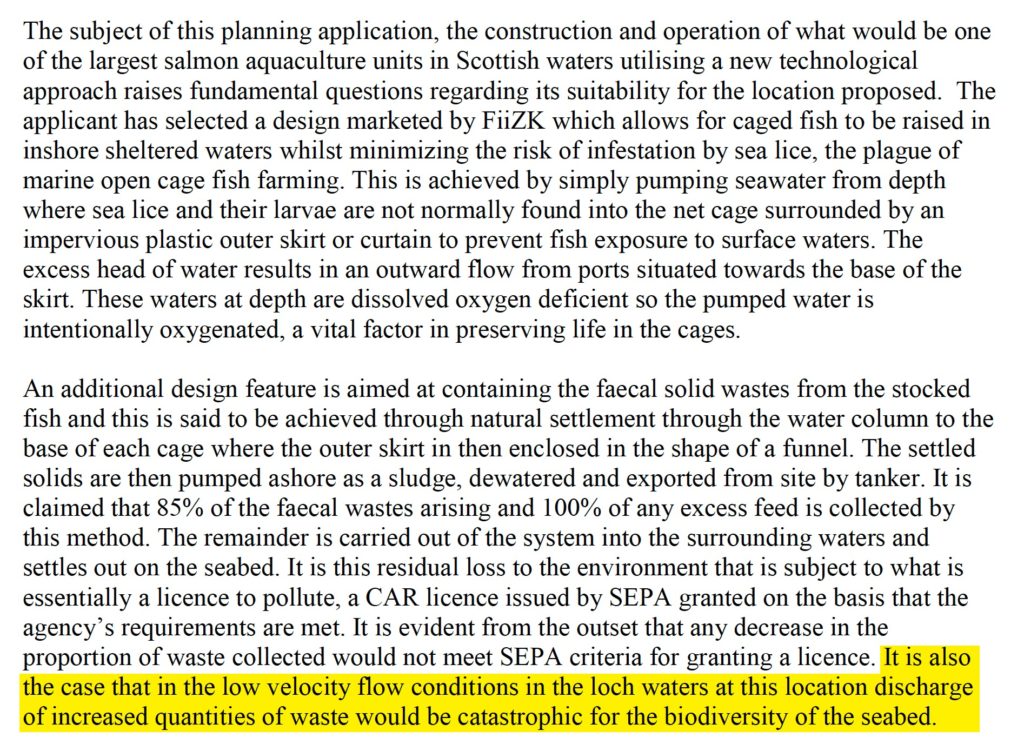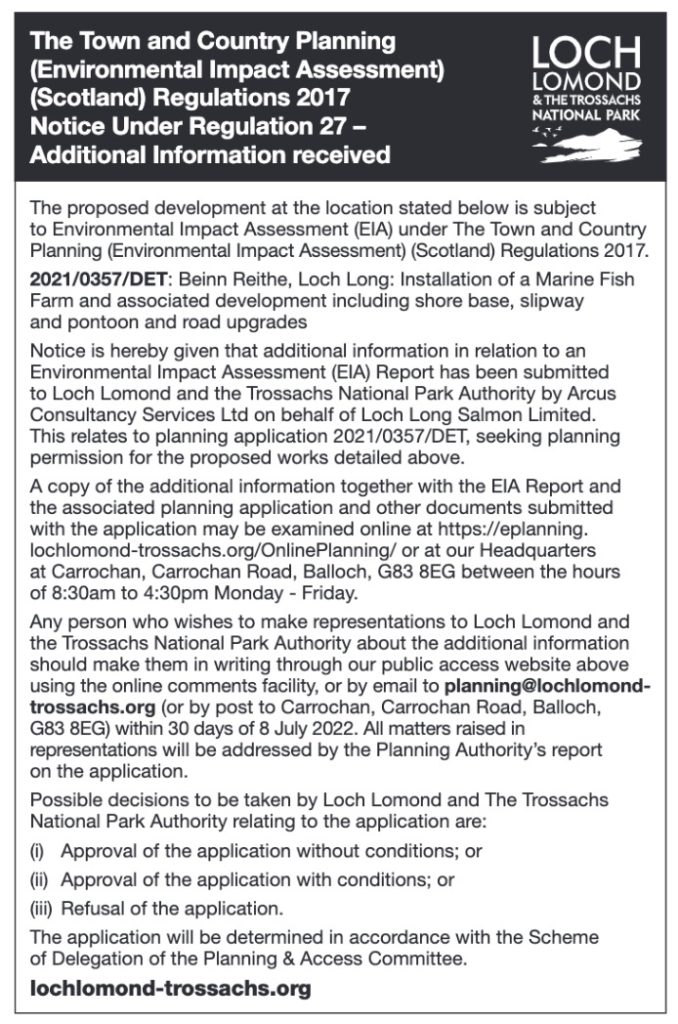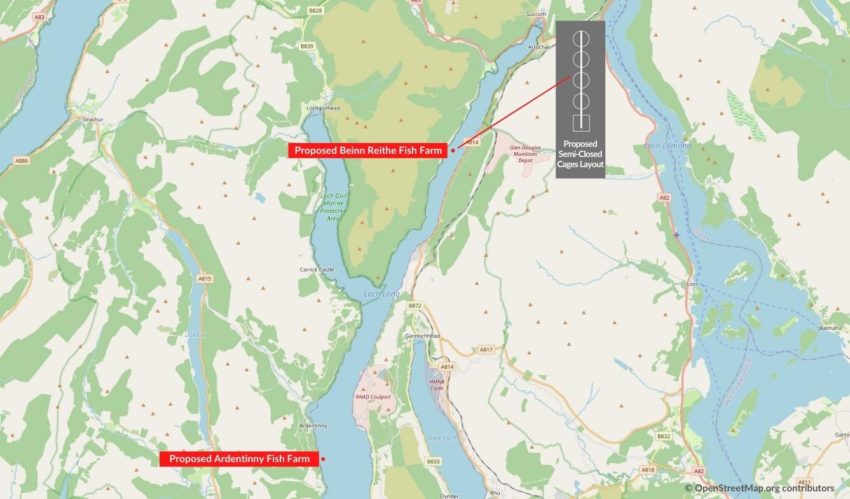In light of Loch Long Salmon Ltd submitting additional information to Loch Lomond and the Trossachs National Park related to its Bienn Reithe Loch Long fish farm planning application, the public now has a second opportunity to submit representations to the Park authority.
Almost 200 members of the public and organisations have so far submitted comments to the National Park. Of these, Some 70% are opposed to the plans which envisage a semi-closed fish farm development.
Two local community councils have submitted objections, including Ardentinny, who regarded the plan wholly inappropriate to be considered in a National Park due to the risk to sensitive wildlife, the environmental impact and the use of new, untried technology.
Cove & Kilcreggan Community Council in their submission stated that, as Loch Long has no fish farms, wild salmonids are free from excessive sea lice. Also mentioned was the high micro-plastic count in the Loch Long water count, the environmental impact and loss of amenity. The community council consider the proposal to be in contravention of the aims of the Park as defined by the 2000 Act which is to conserve and enhance the area as well as to promote sustainable social and economic development of the area’s communities.
Lochgoil Community Council however could not reach a consensus, despite a special meeting being held in early July. The CC stated in their submission “Although there was a majority in agreement with a draft response, it became clear after several days of communication that the Community Council could not come to an agreed position by all six community councillors. Therefore, in the interests of all concerned the Community Council is unable to agree a submission to the planning application, consequently leaving the Community Council to refrain from making any detailed written responses on the Loch Long planning application. It’s important to highlight that the Community Council is not part of the formal planning authority consultation process, and we are also confident that individuals have had an opportunity to make their own representations directly to the planning authority, if they so wished. Consequently, the Community Council, at this stage, has no further consultative role, nor do we have a clear mandate to make any comments on behalf of the wider communities.”
Garelochhead Community Council also could not reach agreement. Having initially submitted an objection in December 2021, and then withdrawing it in July 2022 stating “It is our duty to reflect the broad views of our community and we simply cannot justify an objection at this stage as representative of such. We are currently going back to our community for further input and we will adopt a neutral stance until further notice. as is our duty under our code of practice. We hope to have an updated response soon.”
Of the 70% who have objected to date, many cited that the new technology envisaged was unproven and that the new company lacks experience in its use, as well as the recent problems with a similar venture in Canada.
Objections submitted by organisations included Argyll Fisheries Trust who stated “The proposal to use the site to grow smolts to a size that can be grown on in conventional open cage farms adds nothing to the environment or technology as this is already being done in Scotland at on-shore recirculating hatcheries.”
Addressing the economic argument put forward by the developers, The Community of Arran Seabed Trust (COAST) stated the importance of tourism to the area, and referred to Scotland’s Marine Assessment 2020 report which highlighted that marine tourism contributes almost twice as much Gross Value Added (GVA) as aquaculture as a percentage of Scotland’s total economy and contributes far greater employment opportunities.
In its submission to the planning authority, Friends of the Sound of Jura (a group created to protect wildlife and marine life on the island of Jura) said that the very sheltered upper part of Loch Long is inappropriate for such a large trial of this new technology.
“There is a substantial risk that nutrients released by the farm, in particular dissolved inorganic nitrogen, will remain in the warmer upper waters, causing harmful planktonic blooms which can kill farmed fish and many wild species.”
The group also raised the issue of the closed-containment farms requiring a constant supply of oxygen pumped into the cages. Any interruption to the the oxygen or power supply would rapidly kill all the fish. The group sighted the difficulty in removal by road of waste from a 3,452 tonne farm as well as the effect of climate change where the warmer waters promote harmful algal, bacterial and jellyfish blooms.
Dr. John M. Campbell of Arran considered that there were fundamental flaws related to animal waste generated by what will be one of the largest aquaculture units in Scottish waters:

Concluding, Dr. Campbell said
“…it is my belief that this project should be categorised as major and not be considered under the “Scheme of Delegation”; in other words handled only by the Planning Department. It is an industrial intensive farming development with potentially serious environmental impact in a locality known for is prized visual and amenity value. In conclusion there is no doubt in my mind that this development is totally unsuitable both by virtue of its size and its sensitive location, and also by the unproven nature of the new technology and that the application should be refused on these grounds.”
Read Dr. Campbell’s full text here.
Have your say.
Representations in writing from the public can be submitted to Loch Lomond and the Trossachs National Park Authority within 30 days of 8 July, 2022 (i.e. no later than Sat. 6 August, 2022) via the online comments facility or by email to planning@lochlomond-trossachs.org (or by post to Carrochan, Carrochan Road, Balloch, G83 8EG).
Comments so far submitted to National Park Authority can be viewed here.
Planning Application 2021/0357/DET – Installation of a Marine Fish Farm and associated development including shore base, slipway and pontoon and road upgrades | Beinn Reithe Loch Long.

